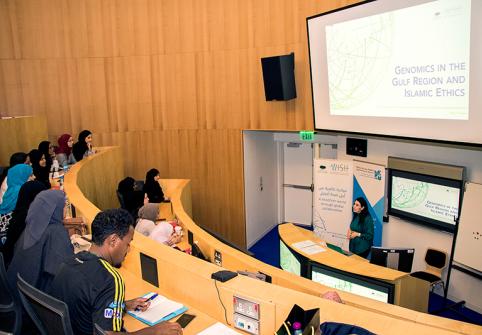News
WISH genomics research presented at Hamad Bin Khalifa University in Qatar
13 Nov 2017Findings presented to first cohort of Genomics and Precision Medicine postgraduate students.

The World Innovation Summit for Health (WISH) presented findings from its research on genomics and Islamic biomedical ethics at Hamad Bin Khalifa University (HBKU) on November 8. The presentation was attended by the inaugural class of HBKU’s Genomics and Precision Medicine program, the first of its kind in the Middle East.
Maha El Akoum, research and policy development officer at WISH and PhD student at HBKU, presented these results, which were outlined in a WISH report titled “Genomics in the Gulf Region and Islamic Ethics.” The 2016 report highlights the Islamic perspective on the ethical management of incidental findings; seeking to find balance between receptiveness toward new healthcare practices while abiding by traditional Islamic customs. Analyzing both vantage points, the report concludes with policy recommendations as potential tools to assist healthcare providers in navigating these scenarios.
El Akoum said: "It's an exciting time to be working in health policy while being a doctoral student in the first genomics PhD cohort at HBKU. Having witnessed this report mature to completion for the 2016 WISH summit, to now be presenting its findings and impact in the local policy sphere to my fellow students is truly a gratifying experience. The Genomics in the Gulf Region and Islamic Ethics report is the perfect example of the importance of bridging the gap between research and policy."
The WISH report is an outcome of the forum on Genomics in the Gulf Region and Islamic Ethics, which was conducted during the 2016 WISH Conference. Chaired by Dr. Mohammed Ghaly, professor of Islam and Biomedical Ethics at HBKU’s Research Center for Islamic Legislation and Ethics (CILE), the forum discussed complex biomedical solutions which pacify religious and moral codes while simultaneously facilitating an open environment for scientific advancement. The report examines focal points addressed during the forum, inclusive of various hypothetical scenarios, from Islamic and moral perspectives, to illustrate how these suggested policies would be put into practice.
Dr. Ghaly commented: “With rapid advancements in the biomedical sciences, it is crucial for both religious scholars and biomedical scientists to continue to debate on certain moral questions and dilemmas. The 2016 WISH conference, and the report thereafter, tackled issues in the field of genomics for the first time in Qatar, bringing together international scholars to address key ethical challenges. The discussions encompassed important topics in genomics, including incidental findings, organ transplants, stem-cell research and beyond, and we were able to reach conclusions and policy recommendations that are both timely and pertinent.”
HBKU’s Genomics and Precision Medicine program, featuring a master’s and PhD track, was launched early this year as a direct response to the challenges facing the country and the region, as outlined by Qatar’s Ministry of Public Health. The University welcomed its first cohort of students in August of this year.
The 2016 research report titled “Genomics in the Gulf Region and Islamic Ethics” can be accessed through the WISH website: www.wish-qatar.org/wish-2016/forum-reports.

